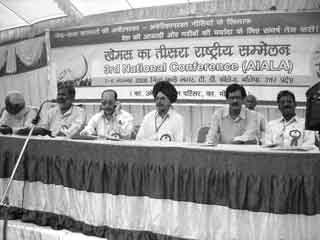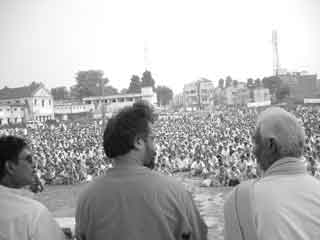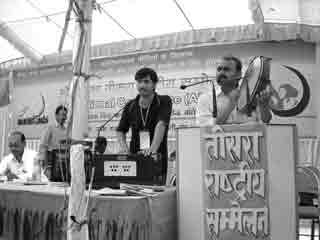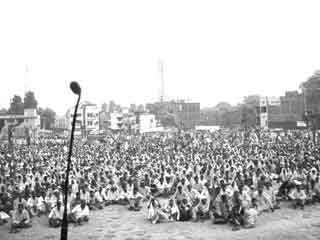SPECIAL REPORT
AIALA Third National Conference: A Resounding Success
As the delegates and other activists started arriving in the city of Ballia for the Third National Conference of AIALA, the city suddenly shook itself awake in surprise at the red wave in town. It was clear that Ballia was witnessing an assertion of the politics of the working classes indeed after a very long time, and many individuals and forces friendly to the Left, including the local leadership of CPI and CPI(M) came to express solidarity. Comrade Dharmdev Lal of CPI, veteran of the freedom struggle and of the historic peasant and agricultural labourer struggles at Kudwa Manikpur (Ballia) in 1948-50, on seeing the AIALA gathering went to the CPI(ML) office and offered a contribution for the Mazdoor-Kisan Adhikar rally and joined the rally. He participated as a guest in the conference and later accepted the shawl offered to him in honour of his communist spirit by CPI(ML) General Secretary Comrade Dipankar Bhattacharya at the end of the two-day Conference.
 The city was decorated with red flags, posters, wall writing and festoons for the occasion and wall writing in different languages could also be seen at the TD college ground. The Reception Committee of the Conference was led by senior advocate Ajay Kumar, who was a leading figure from the area in the 1974 movement and also played an important role in the formation of IPF. He said that it was a proud moment for Ballia residents that their historic but severely neglected district was chosen as the venue for the Conference. He expressed enthusiasm and hope from the movement that AIALA represented as against the current dominant political discourse.
The city was decorated with red flags, posters, wall writing and festoons for the occasion and wall writing in different languages could also be seen at the TD college ground. The Reception Committee of the Conference was led by senior advocate Ajay Kumar, who was a leading figure from the area in the 1974 movement and also played an important role in the formation of IPF. He said that it was a proud moment for Ballia residents that their historic but severely neglected district was chosen as the venue for the Conference. He expressed enthusiasm and hope from the movement that AIALA represented as against the current dominant political discourse.
Addressing the rally on 7 November 2008, Comrade Dipankar Bhattacharya congratulated the growing strength of the organization. He said that India’s ruling class was intent on shackling the country to the crisis-ridden US imperialism. AIALA represented the growing assertion of the rural poor – the main force of struggle against these pro-imperialist policies.
AIALA Office-bearers
President: Comrade Rameshwar Prasad
Vice President: Comrades Swadesh Bhattacharya, Kshitij Biswal, Krishna Adhikari, S. Balasundaram, Malleshwar Rao, Pawan Sharma, Tarsem Jodha, Sajal Pal, Madhvi Sarkar, Manik Pal.
General Secretary: Comrade Dhirendra Jha
Secretaries: Comrades Bangar Rao, Ravi Kr. Phangchu, Sriram Chaudhary, Satyadev Ram, Parmeshwar Mahato, Vidyanand Vikal, Radhika Menon. |
AIALA General Secretary Dhirendra Jha while addressing the rally said that the AIALA would head for further expansion in membership and in the coming Lok Sabha elections it would reach out with the slogan of “Votes of the poor, rule of the rich, won’t do”.
The other speakers at the rally included AIALA President Rameshwar Prasad, Uttar Pradesh State Secretary of CPIML Sudhakar Yadav, Kisan Sabha leader Ishwari Kushwaha, AIALA Bihar Secretary Satyadev Ram, RYA National President Mohammed Salim. Comrade Krishna Adhikari chaired the meeting which was convened by Comrade Shriram Chaudhary. Comrade Rajesh Sahni presented the seven-point political resolution that was passed.
The delegate session commenced in the evening of 7 November 2008 at the TD college campus in a grand pandal constructed for the occasion. A condolence resolution was read out at the beginning of the delegate session to pay homage to comrades who have lost their lives since the last Conference at Rajamundri. Tributes were paid to the martyrs Comrade Langtu Phangchuk, Comrade Ashok Sah, Comrade Ram Baran, Comrade Rajeshwar Das, and Comrade Kameshwar Yadav who were killed for leading struggles of the rural poor. A minute’s silence was kept for comrades who passed away in this period: Comrade Jeeta Kaur, Comrade Ajanta Lohit, Comrade Ram Nageena Ram and others. The assembly of delegates mourned those who have lost their lives in the assaults by communal and fascist forces. The house grieved the loss of life and property in the floods and condemned the neglect by the government of hunger related deaths.
 A 15-member presiding body and a 7-member technical team was constituted for conducting the delegate session. Several fraternal organizations addressed the opening session: Comrade Swapan Mukharjee of AICCTU, Comrade Meena Tiwari of AIPWA, Comrade Raja Ram Singh of Akhil Bhartiya Kisan Sanghrash Samiti and JNUSU President Sandeep Singh.
A 15-member presiding body and a 7-member technical team was constituted for conducting the delegate session. Several fraternal organizations addressed the opening session: Comrade Swapan Mukharjee of AICCTU, Comrade Meena Tiwari of AIPWA, Comrade Raja Ram Singh of Akhil Bhartiya Kisan Sanghrash Samiti and JNUSU President Sandeep Singh.
Comrade Dhirendra Jha presented the report on behalf of the outgoing office bearers. Since its founding conference held in Bhojpur, AIALA has grown in leaps and bounds and the current Conference vowed to continue the movements, membership, militancy and political assertion of the rural poor in contemporary politics. This conference was held with a membership of 25 lakhs, 880 delegates, 73 observers and 58 guests. Amongst the delegates, there were 761 men and 119 women. Two hundred volunteers from Uttar Pradesh looked after the venue and the logistics of the Conference. Rajasthan and Chattisgarh could do not send their delegates due to the elections in the states. However, delegates from 16 other states and 122 districts participated in the two day Conference.
On the second day of the Conference, the Draft document was debated by 30 delegates from across the country who indicated areas for further elaboration and consideration. Apart from this, CPI(ML) Politburo member Ramji Rai, Kartik Pal, Nand Kishor Prasad, N. Murti and several Central Committee members of CPI(ML) addressed the delegates.
Political Resolutions Passed At the Adhikar Rally
1. This assembly condemns the pro-US, pro-rich policies of the state and the central governments and calls to intensify the struggle for freeing the country and upholding the dignity of the poor.
2. This assembly condemns the increasing assault and repression on the democratic rights in various parts of the country and calls for resisting all cases of violation of democratic rights.
3. This assembly condemns the increasing repression on dalits, adivasis, women and minority community and demands the guarantee for their security.
4. This assembly condemns the implementation of the black laws, fake encounter and arrest in the name of terrorism and demands a ban on communal and fascist organizations.
5. This assembly expresses solidarity with the movements across the country against corporate land-grab and those against the capitalist mafia nexus in the control of water, forest and land.
6. This assembly opposes the moves made by central and the state govt. to clamp down on the democratic rights of students by disallowing union elections, and repression on protestors raising their voice against MNS-Shiv Sena’s hooliganism. This assembly expresses solidarity with the student movement and their demands.
7. This assembly of workers and peasants opposes the loot and scams within NREGA public distribution system and BPL. It demands 200 days of employment per year to two members of each family per year and daily wages of Rs. 200 under NREGA; provisions to punish officials and employees who violate NREGA; budgetary allocation for NREGA based on the number of job-card holders; ensuring the names of all the poor in the BPL list and provision of 50 kg grains and 5 litres kerosene per month at the rate of Rs. 2 per kg/litre to all the poor; and a proportionate increase in agriculture labourers’ wages to keep up with inflation. |
AIALA has led struggles on NREGA, BPL, Ration, Land, wage, and social dignity it has emerged as a popular organization of the rural poor. Several militant agitations against corporate land grab have been organized and solidarities have been built with movements across the country. In several places AIALA’s initiatives for homestead land, land reforms and other social initiative have found a popular resonance.
AIALA resolved to intensify land struggles, organize the rural poor on questions of NREGA, BPL, PDS, expose the ruling class loot, agitate for the control of the panchayat bodies and struggle to break the stranglehold of the feudal kulak lobby in the rural areas.
Comrade Dipankar Bhattacharya in his concluding speech expressed confidence that AIALA would achieve its fresh target of 50 lakh membership set for coming days. He said this was essential also to organize the rural poor in class struggles for their political intervention and initiative. He said that other left organization have abandoned the task of organizing this important section of the country and parties like CPI and CPI(M) have resorted to alliances with ruling class parties like BSP, SP, Telugu Desam instead of unleashing the force and the fury of the rural poor on the ruling class policies. Some groups have looked at AIALA’s mobilization as a trade union activity but he
the ruling class policies. Some groups have looked at AIALA’s mobilization as a trade union activity but he  said we are very clear what AIALA can do: it is a means for organizing agrarian labour in the revolutionary cause for social and political transformation. Our organizing efforts have increased our movement against the pro-rich, pro-US policies of the ruling class along with giving an edge to class struggles in rural areas. We have also taken initiatives for raising the class consciousness of the rural poor so that they are the masters of their own destiny.
said we are very clear what AIALA can do: it is a means for organizing agrarian labour in the revolutionary cause for social and political transformation. Our organizing efforts have increased our movement against the pro-rich, pro-US policies of the ruling class along with giving an edge to class struggles in rural areas. We have also taken initiatives for raising the class consciousness of the rural poor so that they are the masters of their own destiny.
The Conference elected a 163-member National Council and a 43-member National Executive. Comrade Rameshwar Prasad was re-elected as the President and Comrade Dhirendra Jha as the General Secretary apart from 10 Vice Presidents and 8 National Secretaries.
Songs and poetry—in Hindi, Bhojpuri, Punjabi, Oriya, Telugu, Bengali, Assamese, Tamil and other languages—were rendered in the course of the two-day event. The venue for the Conference was named to honour comrades who have laid down their lives in the struggle to assert the rights of the working rural poor. The sessions were held in a hall named after Comrade Umesh Paswan, the stage after Comrade Moti and the city was named after Chitu Pandey. An exhibition depicted the status of agricultural workers. Another set of posters also depicted the movement from 1857 to the movement towards the assertion of the rural poor. The area looked festive with displays and book stalls and delegates took the opportunity to look at the new publications and hear the newly composed revolutionary songs and music and documentary films.
 The city was decorated with red flags, posters, wall writing and festoons for the occasion and wall writing in different languages could also be seen at the TD college ground. The Reception Committee of the Conference was led by senior advocate Ajay Kumar, who was a leading figure from the area in the 1974 movement and also played an important role in the formation of IPF. He said that it was a proud moment for Ballia residents that their historic but severely neglected district was chosen as the venue for the Conference. He expressed enthusiasm and hope from the movement that AIALA represented as against the current dominant political discourse.
The city was decorated with red flags, posters, wall writing and festoons for the occasion and wall writing in different languages could also be seen at the TD college ground. The Reception Committee of the Conference was led by senior advocate Ajay Kumar, who was a leading figure from the area in the 1974 movement and also played an important role in the formation of IPF. He said that it was a proud moment for Ballia residents that their historic but severely neglected district was chosen as the venue for the Conference. He expressed enthusiasm and hope from the movement that AIALA represented as against the current dominant political discourse. A 15-member presiding body and a 7-member technical team was constituted for conducting the delegate session. Several fraternal organizations addressed the opening session: Comrade Swapan Mukharjee of AICCTU, Comrade Meena Tiwari of AIPWA, Comrade Raja Ram Singh of Akhil Bhartiya Kisan Sanghrash Samiti and JNUSU President Sandeep Singh.
A 15-member presiding body and a 7-member technical team was constituted for conducting the delegate session. Several fraternal organizations addressed the opening session: Comrade Swapan Mukharjee of AICCTU, Comrade Meena Tiwari of AIPWA, Comrade Raja Ram Singh of Akhil Bhartiya Kisan Sanghrash Samiti and JNUSU President Sandeep Singh.  the ruling class policies. Some groups have looked at AIALA’s mobilization as a trade union activity but he
the ruling class policies. Some groups have looked at AIALA’s mobilization as a trade union activity but he  said we are very clear what AIALA can do: it is a means for organizing agrarian labour in the revolutionary cause for social and political transformation. Our organizing efforts have increased our movement against the pro-rich, pro-US policies of the ruling class along with giving an edge to class struggles in rural areas. We have also taken initiatives for raising the class consciousness of the rural poor so that they are the masters of their own destiny.
said we are very clear what AIALA can do: it is a means for organizing agrarian labour in the revolutionary cause for social and political transformation. Our organizing efforts have increased our movement against the pro-rich, pro-US policies of the ruling class along with giving an edge to class struggles in rural areas. We have also taken initiatives for raising the class consciousness of the rural poor so that they are the masters of their own destiny.